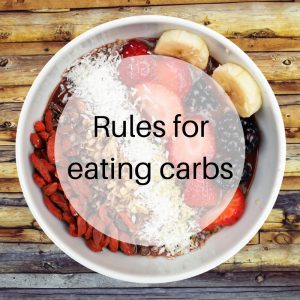There are many rules for eating carbs so if you’re asking yourself any of these questions then this blog is definitely one for you!
There are different types of carbs?
Should I avoid eating carbs?
Eating carbs in a low-moderate amount is a useful trick for losing body fat. But low-carb diets gone wrong cause more trouble than they’re worth! With the rise of low-carb diets, optimal carb intake has been forgotten.
Follow these simple rules for eating carbs and optimising your carb intake to stay lean and maintain a healthy body composition.
Rules for eating carbs
#1 Avoid refined grains
Don’t buy them, don’t eat them…don’t even look at them!
Why? Because refined grains:
- Are high in calories
- Are nutritionally empty
- Contain no useful fiber
- Spike blood glucose levels the same way as eating sugar
- Trigger food intake chemicals, meaning you can eat more of them without feeling full and end up overeating
- Change the architecture of your brain over time because they alter neurotransmitter levels
- Increase your risk of developing diabetes if eaten frequently
#2 Avoid processed carbs
Processed carbs often contain refined carbs but also have a bunch of sugar, preservatives and other crap added in that makes them light up the parts of the brain that are involved in reward and addiction. You’ll be able to eat these till the cows come home without ever feeling satisfied.
#3 Avoid high starch foods
Think soy, wheat, corn and potatoes. These tend to make up about 50% of the western diet. The problem with starch is that it is rapidly digested into glucose, causing a big spike in blood sugar levels only to plummet back down making you feel tired, sluggish and craving some more high starch foods for that sugar high. So save yourself the trouble and avoid eating them as much as possible.
#4 Consider removing other grains
Most grains are calorie rich and nutrient poor, especially when compared to vegetables.
#5 If you can’t go without grains…choose heirloom, gluten-free varieties
Things like millet, buckwheat and amaranth are all heirloom grains that have been cultivated the same way for thousands of years. They are also highly nutritious, containing more vitamins and minerals than other grains and are also gluten free. Because of their high fiber and antioxidant content, all 3 are beneficial for blood sugar control and great comfort food as the temperature starts to dip.
#6 Your main source of carbs should be fibrous
Fibrous carbs are rich sources of vitamins, minerals, phytochemicals and other nutrients and tend to be green vegetables. They are packed full of fiber, which slows digestion, delaying carbohydrate absorption into the blood. They are great ‘colon cleansers’ and are essential for keeping the digestive process running clean and healthily!
Thanks to the high fiber it’s almost impossible to overeat as well! So try to include leafy greens (spinach, rocket, etc), cruciferous veggies (broccoli, cauliflower), and things like brussel sprouts, asparagus, capsicums and many more onto your plate.
#7 The darker the fruit the better it is for you
Dark red, blue and purple fruits are great anti-inflammatories because they contain lots of antioxidants which help to remove free radicals that cause ageing and inflammation. They include things like plums, nectarines and berries of all kinds.
#8 Eat foods that improve insulin sensitivity with higher carb foods
Certain foods increase insulin sensitivity and improve the bodies ability to store the carbs you eat as muscle glycogen, which is a fuel source for muscles. Try cooking foods with healthy fats (olive oil, coconut oil), flavouring food with vinegar and citrus, and spicing food with turmeric and cinnamon as these all lower the insulin response to high carb foods.
#9 Eliminate all liquid carbs
This means sports drinks, fruit juice, soft drink, sweetened drinks like iced tea/coffee. Liquid carbs have zero fiber and spike insulin. But, the worst thing is that the brain doesn’t register liquid calories the same way as it does with food. Meaning that drinking your carbs won’t reduce hunger, so you’ll need something else, making you consume more calories than you need to.
#10 Eat the right carbs at the right time
The best time to eat carbs is straight after a workout. Your metabolism will be boosted and you’ll be burning calories at a higher rate. And the body will use carbs more readily to replenish energy (glycogen) within muscles instead of storing them as fat.
Plus, eating carbs post workout can lower levels of the stress hormone cortisol, helping you de-stress and recover faster.
The worst time to eat refined and high GI carbs is pre-workout because it will cause an increase in insulin which shifts the body away from burning fat. It also reduces energy levels and motivation.
The second worst time to eat higher carb foods is for breakfast, such as cereal, toast, juice.
If you found this blog helpful then please feel free to share and if you wanted any more tips or tricks head over to our Facebook page and check it out and if you can’t find what you’re looking for then post a question and we will answer it for you!

